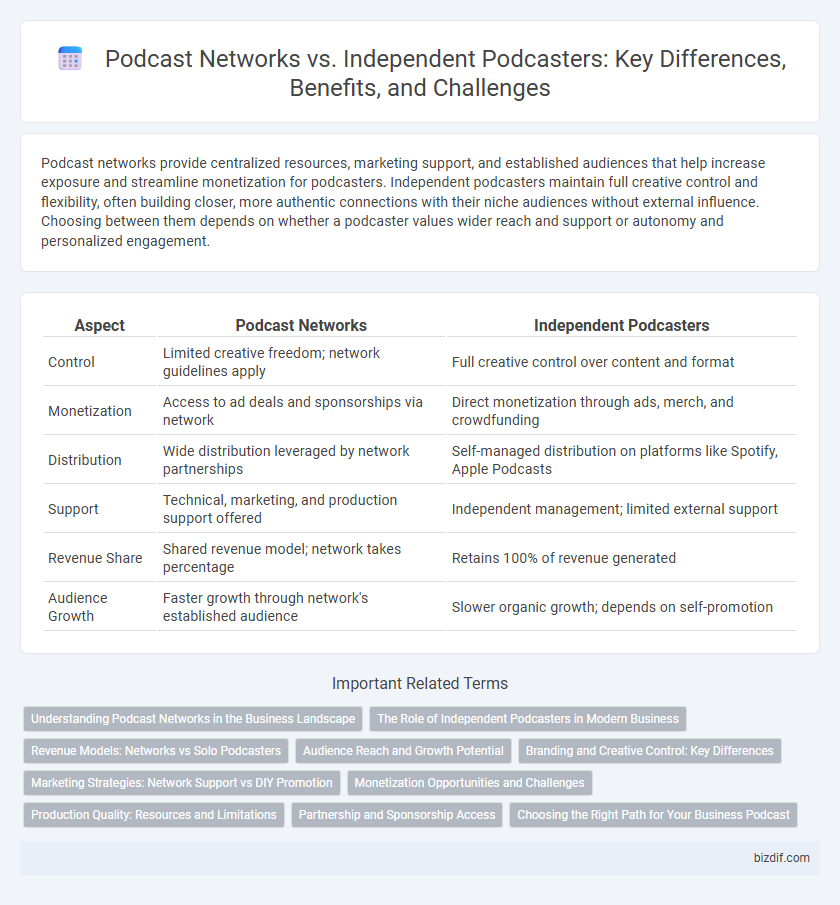Podcast networks provide centralized resources, marketing support, and established audiences that help increase exposure and streamline monetization for podcasters. Independent podcasters maintain full creative control and flexibility, often building closer, more authentic connections with their niche audiences without external influence. Choosing between them depends on whether a podcaster values wider reach and support or autonomy and personalized engagement.
Table of Comparison
| Aspect | Podcast Networks | Independent Podcasters |
|---|---|---|
| Control | Limited creative freedom; network guidelines apply | Full creative control over content and format |
| Monetization | Access to ad deals and sponsorships via network | Direct monetization through ads, merch, and crowdfunding |
| Distribution | Wide distribution leveraged by network partnerships | Self-managed distribution on platforms like Spotify, Apple Podcasts |
| Support | Technical, marketing, and production support offered | Independent management; limited external support |
| Revenue Share | Shared revenue model; network takes percentage | Retains 100% of revenue generated |
| Audience Growth | Faster growth through network's established audience | Slower organic growth; depends on self-promotion |
Understanding Podcast Networks in the Business Landscape
Podcast networks consolidate multiple shows under one brand, offering podcasters access to shared resources like marketing, monetization, and cross-promotion, which can streamline growth and revenue generation. These networks often secure advertising deals collectively, increasing bargaining power and providing a more stable financial model compared to independent podcasters who handle all business aspects alone. Understanding the role of podcast networks is key for creators seeking scalable business opportunities and enhanced industry connections within the competitive podcasting landscape.
The Role of Independent Podcasters in Modern Business
Independent podcasters drive innovation in modern business by creating niche, authentic content that resonates deeply with targeted audiences. Unlike podcast networks, they maintain full creative control and direct audience engagement, fostering strong community loyalty and unique brand partnerships. Their agility and personalized approach enable rapid adaptation to market trends, making them pivotal players in digital marketing strategies.
Revenue Models: Networks vs Solo Podcasters
Podcast networks generate revenue primarily through advertising partnerships, sponsorship deals, and cross-promotion across multiple shows, enabling higher CPMs and diversified income streams. Independent podcasters rely more on direct monetization methods such as listener donations, crowdfunding platforms, merchandise sales, and niche sponsorships tailored specifically to their audience. Revenue scalability often favors networks due to pooled resources and broader audience reach, while solo podcasters maintain greater control over content and revenue channels but face challenges in expanding beyond limited market segments.
Audience Reach and Growth Potential
Podcast networks offer larger audience reach through shared marketing resources and cross-promotion opportunities, significantly boosting discoverability. Independent podcasters maintain full creative control but often face slower audience growth due to limited promotional capacity and resources. Aligning with a network can accelerate growth by tapping into established listener bases, whereas independence requires strategic self-promotion and consistent content quality for gradual audience expansion.
Branding and Creative Control: Key Differences
Podcast networks offer podcasters established branding resources and marketing channels, enhancing audience reach while often requiring content alignment with network standards. Independent podcasters maintain full creative control, allowing for unique, authentic content but face challenges in building brand recognition and managing promotion independently. Balancing the trade-off between collaborative branding strength and autonomous creative freedom is essential when choosing between a podcast network and independent production.
Marketing Strategies: Network Support vs DIY Promotion
Podcast networks provide centralized marketing resources, leveraging cross-promotion, advertiser relationships, and audience analytics for broader reach and sustained growth. Independent podcasters rely on DIY promotion tactics such as social media engagement, SEO optimization, and community building to cultivate niche audiences. Network support streamlines brand consistency and monetization, while independent creators benefit from flexible, personalized marketing approaches tailored to their unique content and goals.
Monetization Opportunities and Challenges
Podcast networks provide aggregated audiences and shared resources that enhance monetization opportunities through sponsorship deals and advertising revenue, offering greater market reach compared to independent podcasters. Independent podcasters face challenges such as securing consistent sponsorships and limited exposure but retain full creative control and revenue ownership. Monetization strategies vary significantly, with networks leveraging economies of scale while independents often rely on direct listener support and niche market engagement.
Production Quality: Resources and Limitations
Podcast networks provide access to professional studios, sound engineers, and high-end editing software, significantly enhancing production quality. Independent podcasters often face budget constraints, relying on basic recording equipment and limited post-production capabilities. These resource disparities directly impact the overall audio clarity, consistency, and polish of podcast episodes.
Partnership and Sponsorship Access
Podcast networks offer podcasters enhanced partnership opportunities and streamlined access to high-value sponsorships through collective bargaining power. Independent podcasters often face challenges securing lucrative brand deals individually due to limited reach and negotiation leverage. Collaborating within a network amplifies exposure to advertisers and delivers consistent monetization streams unavailable to many solo creators.
Choosing the Right Path for Your Business Podcast
Podcast networks offer podcasters structured support, including marketing resources, monetization opportunities, and audience growth strategies, making them ideal for those seeking scalability. Independent podcasters retain full creative control and ownership of their content, appealing to creators who prioritize flexibility and direct audience engagement. Evaluating goals such as revenue models, brand alignment, and content distribution can guide the decision between joining a network or remaining independent.
Podcast Networks vs Independent Podcasters Infographic

 bizdif.com
bizdif.com